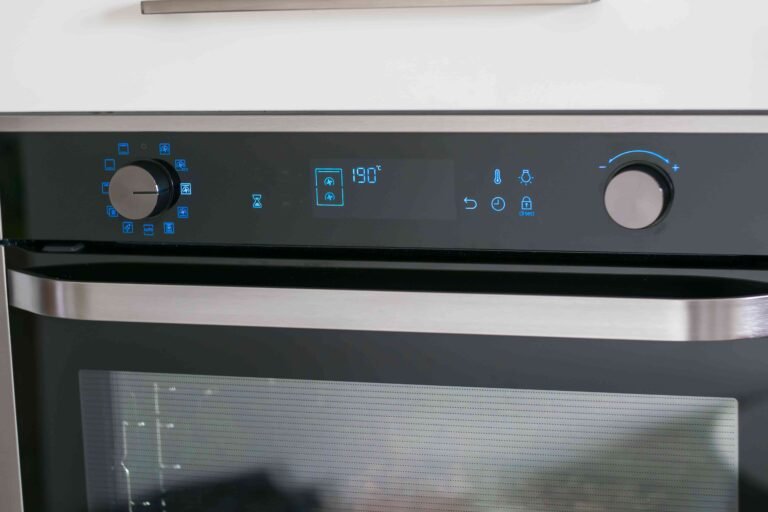:max_bytes(150000):strip_icc():format(jpeg)/GettyImages-12927890671-ed41d3ac64fd41449afbeb299f6a0078.jpg)
Self-cleaning ovens are designed to make life easier, eliminating the need for harsh detergents and scrubbing. Just hit the self-clean button and it will do the dirty work for you, right? Not necessarily.
Some people believe they can clean more thoroughly by hand than by machine. Others claim that this feature helps keep the inside of their oven sparkling clean while saving time and effort.
In our quest to get to the bottom of the oven cleaning debate, we turned to cleaning and appliance experts for answers. Read on to find out if self-cleaning ovens really work and what you need to know before hitting the self-clean button.
Meet the expert
- Ken Doty is the CEO and cleaning expert at The Maids.
- Ramirez Mouse is the owner and operator of MCS Cleaning Services and has 30 years of experience in the cleaning industry.
- James Copeland is the technical services director at Prism Specialties, a restoration company.
How does the self-cleaning feature work?
You may be wondering what happens when your oven is set to self-clean. Why does the oven door lock? Why is there smoke coming from inside the oven? Note: During this process, a small amount of smoke and a burning smell is expected.
Essentially, this feature uses high heat to remove stubborn stains, food drips, and grease. Ken Doty, CEO and cleaning expert at The Maids, explains:
“During this process, the furnace temperature increases dramatically, often exceeding 800°F (427°C).” He notes that this initiates a process of decomposition of organic matter inside the furnace, known as pyrolysis.
“As these organic materials decompose, they turn into a fine ash that can be easily cleaned up once the process is complete,” says Doty.
Want more cleaning and organizing tips? Sign up for our free daily newsletter for the latest tips, expert advice, and more!
So do self-cleaning ovens work?
Doty says this feature definitely offers a cleaning advantage for ovens with light to medium stains. Since the high temperatures generated during the cycle burn off those stains, all you have to do is wipe the ash off the oven floor.
Additionally, this level of cleaning is difficult to achieve by hand scrubbing alone, especially in hard-to-reach areas.
However, in cases of heavy build-up or spillage, he recommends cleaning the oven by hand before starting the self-cleaning process.
“This precaution can help minimize smoke and odors, ensuring a more thorough cleaning.”
Mause Ramirez, owner of MCS Cleaning Services, agrees, saying you should clean your oven by hand if you use it frequently and cook pasta, pizza, or anything prone to spills.
“Any spills or burns should be cleaned by hand and with oven-safe cleaning products,” he says. But if your oven gets little use, do it—but maybe only once a year, suggests Ramirez.
Tips for using the self-cleaning feature on your oven
Again, fumes are a common byproduct of running a self-cleaning cycle, so it’s important to keep your kitchen well ventilated, reminds James Copeland, technical services manager at Prism Specialties.
The self-cleaning cycle has the potential to create carbon monoxide, depending on what was spilled inside, he says, so in addition to opening the windows and running the hood, make sure you have a working carbon monoxide detector in your kitchen.
One more thing to note: it is best to keep children and pets (especially birds) out of the room while the self-cleaning function is in use.
Smoke and strong odors can be irritating to children, plus the hot surface of the oven can cause serious burns.
Defect
Ramirez is one of many cleaning professionals who prefers manual cleaning over self-cleaning. Not handling heavy spills and burnt-on residue well is just one reason.
First of all, the self-cleaning cycle is energy-intensive, requiring a significant amount of electricity or gas to reach and maintain the high temperatures needed for the cleaning process, Ramirez said.
Extreme temperatures can also cause wear and tear on oven parts over time, which could lead to the need for more frequent repairs or even premature oven replacement, he said.
Worse yet, we’ve all heard horror stories of self-cleaning ovens causing fires. This can happen if you leave large food scraps and spills in the oven—bread crumbs, baking drips, and grease are all flammable. So, yes, you’ll still need to lightly scrape the bottom of your oven before cleaning it yourself if you’re not already in the habit of wiping it down after every use.
“It’s important to follow safety instructions carefully and never leave the oven unattended while cleaning,” advises Ramirez.
